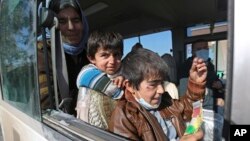The Islamic State group has released at least 200 Yazidis after five months of captivity in Iraq.
Islamic State fighters transported the freed Yazidis by bus to Hawaija, 55 kilometers southwest of Kirkuk, and from there they took cars to the Khaled Bureau District some 25 kilometers away where they entered Kirkuk.
Officials said almost all of those released Saturday were elderly or sick, including several children, and nearly all bore signs of abuse and neglect.
Gen. Shirko Fatih, commander of Kurdish peshmerga forces in the northern Iraqi city of Kirkuk, said it appears the militants released the prisoners because they were too much of a burden.
"It probably became too expensive to feed them and care for them,"he told The Associated Press.
Islamic State fighters attacked the Yazidis in August, forcing thousands of them to flee to Sinjar mountain.
Yazidi faith
Islamic State militants declare most people in their path infidels, but seem to reserve a special wrath for those of the Yazidi faith.
In their advance across Iraq, Islamic State fighters have summarily shot and killed Yazidi men, kidnapped women and girls, and boasted of selling them as slaves. Recent guidelines by the Islamic State group detail the types of sexual and other assault that slaves may be subjected to.
Many Yazidi villages remain under Islamic State control.
"Their situation is very bad, especially the psychological condition," said Hersh Hussein, a representative from the Irbil governor's office who was in Alton Kupri. "Regarding other diseases we provide first aid and the most important medical treatment."
Maha Faris Qassem, 35, was released with her two young sons, both of whom were covered from head to toe in bug bites, which appeared to be infected. She said the conditions of their captivity were so dire that infection was inevitable.
Yazidis are ethnic Kurds whose ancient, monotheistic religion has links to Zoroastrianism.
Yazidis have suffered repeated bouts of discrimination over the centuries, in particular by Arab Muslims who misunderstand their faith.
"I don't know the details of why they released us," Gawre Semo, 69, told AP. "They are very bad people. They took our children and they took the women. They did bad things with us. We've been humiliated by them."
Some material for this report came from Reuters and AP.





